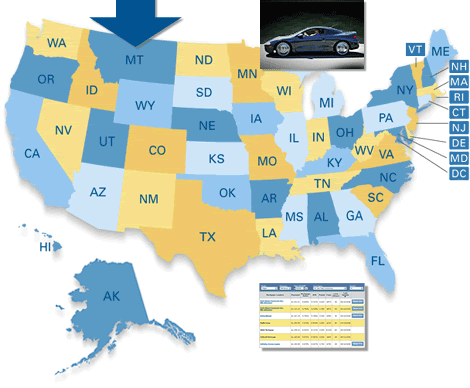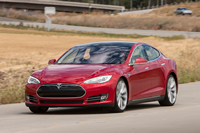Automotive Loans: Buying Vs Leasing
by Amy Lillard
(1/2/2013) As car prices have skyrocketed over the last decades, an important alternative has emerged to the typical car purchase.
When consumers purchase a car through a car loan, they pay an initial down payment along with a certain amount of principal and interest over a specified time period. After the loan is complete, the buyer owns the car. In contrast, leasing is similar to renting an apartment. Consumers place a low or no down payment along with monthly rental payments. At the end of the specified time period, typically 2-4 years, the driver either signs another lease agreement or procures a loan to buy the car. They do not own the car outright.
Choosing leasing over buying offers several benefits and drawbacks to the consumer:
Benefits of Leasing:
• Lower down payments. Most common lease deals do require a down payment. But in most cases, this down payment requirement is significantly lower than those required by typical car loans. Just as with buying, the more the down payment, the lower the monthly payments.
• Lower monthly payments. When leasing, the monthly payments do not comprise principla and interest for a loan. Instead, they are used to offset the depreciation on the car rather than the full value. This means monthly payments are substantially lower than loan payments.
• Simple process. When the lease agreement is completed, and assuming the car is still in good shape, consumers can simply turn over the keys in exchange for a different car and lease arrangement. While those selling their cars need to be concerned with trade-in value and negotiation, these were established in the initial lease agreement.
• Business expenses. When leasing, depreciation and financing costs can be deducted from your taxes.
Drawbacks of Leasing:
• No equity. While monthly payments on a car loan add up to ultimate ownership, otherwise known as building equity, monthly payments on a lease do not.
• Locked in. Exiting a lease agreement prior to the end for any reason can result in paying big penalties. Depending on the leasing company, this could add up to several months of payments.
• Mileage costs. In a typical lease agreement, the company sets forth a mileage limit for each year. As drivers average 15,000 miles per year, these mileage requirements typically span 12,000-15,000 miles per year. Drive over that limit, and you may incur fees of 12 to 15 cents per extra mile. In addition, if any damage occurs drivers will need to pay.
• Insurance limits. In cases of accidents and theft, insurance may only reimburse the car market value and not the amount still owed on your lease. Drivers will be responsible for this “gap” unless additional insurance is purchased or included in the lease agreement.
The decision to lease or buy will depend on your personal preferences, circumstances, and finances. Overall, if owning is attractive, buying should be the goal. If lower upfront and monthly costs are more attractive, leasing might be the better goal.
For Additional Reading:
Buy or Lease?
http://www.cars.com/go/advice/Story.jsp?section=lease&subject=buy_lease&story=buyLease Is it Smarter to Buy or Lease?
http://auto.howstuffworks.com/buying-selling/buy-or-lease.htm
 A frequent contributor to ERATE® since 2006, Amy Lillard is a freelance writer specializing in turning complex information into useful tips and tricks for readers. For questions or topic suggestions, contact Amy at [email protected].
A frequent contributor to ERATE® since 2006, Amy Lillard is a freelance writer specializing in turning complex information into useful tips and tricks for readers. For questions or topic suggestions, contact Amy at [email protected].
Other related articles:
Automotive Loans: Applying for a Car Loan
Avoid advertised auto trade-in, loan pay-off rip-offs
Auto sales, loans hit the speedway
High MPGs and low auto loan rates can save you thousands of dollars
Research your options when shopping for an auto loan
How to drive a hardauto loan bargain
Special Report: Hitting the Brakes on Auto Dealer Loans
Buying vs. Leasing: A Comparison
Closed End Lease or Open End Lease
New and Used Auto Loan Rates
Choose Your State Below

Start by selecting your state

Amy Lillard
The ERATE® Resource Guide to No-Closing-Cost Refinancing
Principal Reduction: New Programs, More Controversy
Understanding Mortgages: Mortgage Paperwork
Understanding Mortgages: Types of Mortgages
Understanding Mortgages: How to Get a Mortgage
Understanding Mortgages: Buy or Rent?
Understanding Mortgages: Working with a Real Estate Agent
Understanding Mortgages: Working with a Real Estate Agent

Automobile Buying/Financing
5 Steps to Find the Perfect Car
Auto loan defaults to rise 7 percent in 2010
Auto Show Season Tips for Buyers
Consumer Reports suspends recommendations for Toyota's recall models
When is the Best Time to Buy a New Car?
Making a Vehicle Purchase? Enjoy These Helpful Tips
Chances are, your next car will be used. Drive a hard bargain
What your car is really saying
2012 President's Day auto sales among best ever
Special Report: Hitting the Brakes on Auto Dealer Loans
Auto Insurance
Buying Ins - Shopping for Insurance
Best Car Insurance Plan for You


